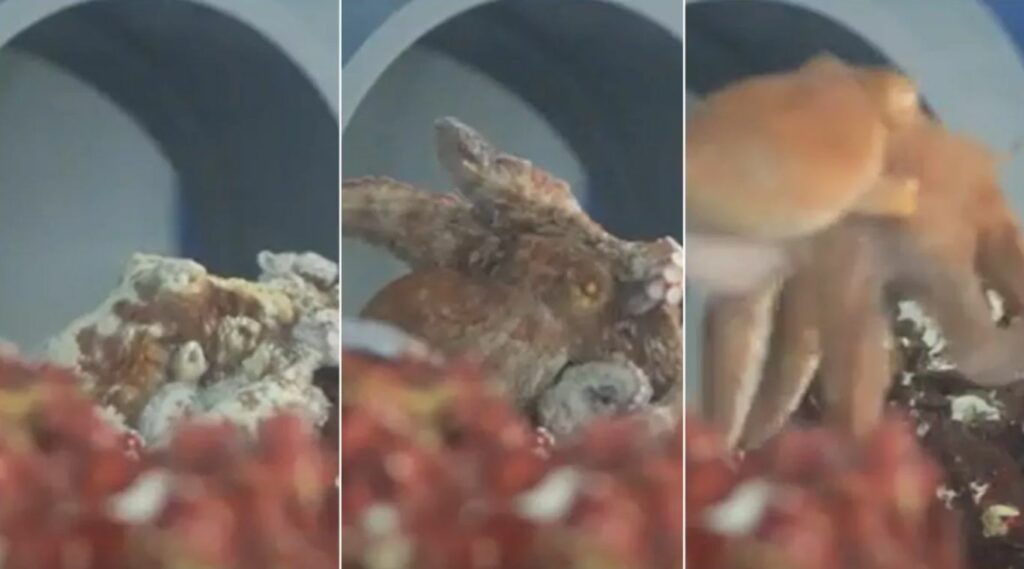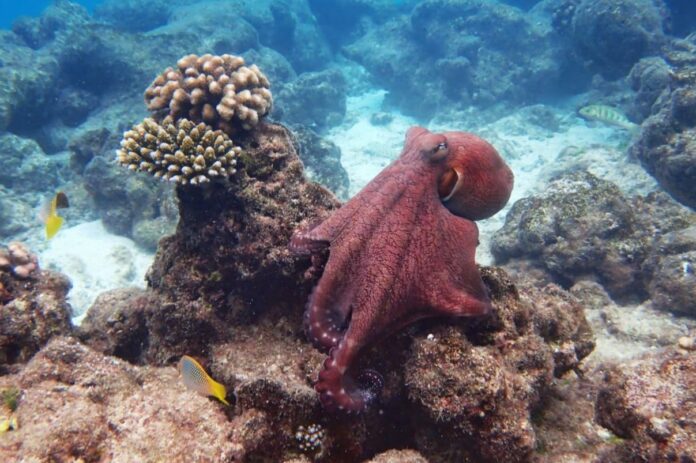Nature continues to astound us with its hidden wonders. Witness the unveiling of a surprising behavior that unites octopuses and humans in ways never before witnessed.
Researchers at a laboratory in New York have captured an octopus displaying strange behaviors that could potentially be attributed to the occurrence of nightmares. During a month-long observation period, scientists carefully monitored the octopus as it abruptly awakened from a peaceful slumber and engaged in agitated movements, reminiscent of symptoms associated with certain sleep disorders.
However, it is important to approach these findings with caution, as alternative explanations for the octopus’s actions cannot be ruled out. Experts emphasize the need for careful interpretation, given the complexity of animal behavior. Nevertheless, the distinctiveness of these observations undoubtedly warrants further investigation into this unusual phenomenon.
Eric Angel Ramos, a postdoctoral researcher at the University of Vermont who contributed to the octopus footage, emphasized that despite the numerous studies conducted on octopuses and other cephalopods, our understanding of these fascinating creatures remains limited.
“There’s still so much we don’t know” about them.
Video recordings obtained from a laboratory situated at Rockefeller University in New York have documented a series of intriguing events involving an Octopus insularis named Costello. The footage reveals four distinct episodes during which Costello seemingly exhibited a tranquil state of slumber within a containment tank, only to abruptly engage in vigorous thrashing movements with its tentacles. Notably, during two of these incidents, Costello expelled a forceful burst of dark ink into the surrounding water—a widely observed defensive maneuver employed by various species to deter potential predators.
“It was really bizarre,” comments Ramos as “it looked like he was in pain; it looked like he might have been suffering, for a moment.”

And after that “he just got up like nothing had happened, and he resumed his day as normal.”
According to a research team, certain behaviors exhibited by an animal bear resemblance to those seen in octopuses when they encounter predators in their natural habitat. These behaviors were outlined in a preprint (which has not undergone peer review) recently posted to the bioRxiv server. The researchers speculated that these actions could indicate either a negative episodic memory response or a type of sleep disorder known as parasomnia. However, they also stressed that these observations do not allow for definitive conclusions to be drawn.
In recent times, scientists have made advancements in understanding octopus sleep patterns. In 2021, a study was published by researchers documenting the presence of a two-stage sleep cycle in these animals. This cycle consists of “active” and “quiet” sleep phases, resembling the alternating rapid eye movement (REM) and non-REM sleep observed in humans. Since most human dreaming occurs during REM sleep, some scientists have pondered the possibility of octopuses experiencing similar dream-like states during their “active” sleep phase.
Nevertheless, a cautionary note comes from an unaffiliated expert regarding the interpretation of the octopus’s behavior as indicative of dreaming. Robyn Crook, a comparative neurobiologist at San Francisco State University, urges prudence due to our limited understanding of the neuroscience of sleep in cephalopods. In an interview with Live Science, she emphasizes that we lack sufficient knowledge to determine whether these creatures dream at all, let alone experience nightmares. Furthermore, even if octopuses do engage in dreaming, it is plausible that their dreaming process differs substantially from that of humans.
“It’s not something that we could easily answer,” Crook told Live Science. “It’s a very philosophical question.”
According to the expert, while the behaviors captured in this video are indeed fascinating, it is highly probable that they were motivated by factors other than dreams.
Image Credit: Ramos et al and Getty
